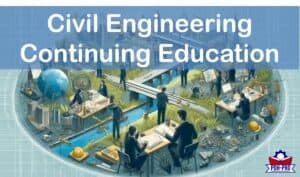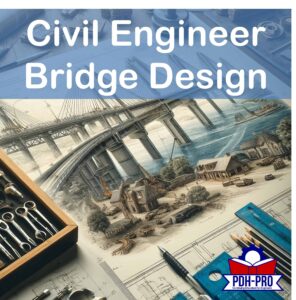Civil Engineering Continuing Education
The Importance of Continuing Education
Table of Contents
From designing roads and bridges all the way to developing waste disposal systems, civil engineers pretty much deal with the entire infrastructure of our society as they continue to improve the quality of life and advance civilization.
Getting into civil engineering, students are generally swayed by the many positives of this particular discipline such as the abundance of job opportunities in various fields as well as the good pay after graduating.
Civil engineering is surely an exciting domain where engineers play vital roles in construction projects from the very start of the idea until the moment it becomes a reality.
However, with technologies developing at a rapid pace and the world population increasing at an even faster rate, civil engineers are now facing new challenges by the second due to heightened expectations of the public while handling more complex tasks than ever before.
Why Should Civil Engineers Consider Continuing Education Courses?
There are many reasons why continuing education is highly sought after by university graduates, especially ones of major professions such as engineering. So let’s break down why civil engineers, in particular, should consider continuing education courses:
Rising Demands of the Civil Engineering Profession
In the United States, the number of individuals employed as civil engineers reached almost 327,000 in the year 2018. According to the US Bureau of Labor Statistics, employment of civil engineers is expected to grow 6 percent from the year 2018 to 2028.
Such an increase is mostly the result of the U.S. infrastructure becoming more and more obsolete. Civil engineers will be required to manage all sorts of projects involving rebuilding, upgrading, and repairing roads, bridges, dams, airports, and other structures.
 Civil engineers will also be in high demand for modern areas of work such as renewable-energy projects. Consequently, as these new programs are approved, civil engineers will be partaking key roles in directing the construction of various structures including wind farms and solar arrays.
Civil engineers will also be in high demand for modern areas of work such as renewable-energy projects. Consequently, as these new programs are approved, civil engineers will be partaking key roles in directing the construction of various structures including wind farms and solar arrays.
Unlike other major professions such as medicine and scientific research, engineers can easily enter the industry with only a bachelor’s degree to their name. But the upcoming change in job demands calls for more diverse and sophisticated skills.
The American Society of Civil Engineers (ASCE) had a group of civil engineers and leaders formulate a vision of the future of civil engineering. It was made clear by ASCE president, Mr. David Morgan, that technical expertise alone won’t be nearly enough to successfully practice engineering in the future.
Civil engineers who wish to remain current and in-demand must acquire additional skills to make them sufficiently competent for leading and overseeing the complex projects of the 21st century. This can only be achieved through participation in continuing education.
Moreover, national and international engineering organizations, along with ASCE, strongly encourage the concept of life-long learning for civil engineers to stay current and keep up with modern-day requirements.
Maintaining the Professional License
The ASCE’s Code of Ethics states that engineers must continue their professional development throughout their careers by engaging in approved forms of professional practice such as continuing education courses as well as attending seminars, webinars, and meetings. The goal is to remain up to date with all the developments in their specialty fields.
Following this notion, many state boards now require all registered professional engineers to complete a certain number of continuing education hours, which is to be done on a yearly basis. However, the number of hours and the type of continuing education can differ from one state to the other.
For example, the Texas Engineering Board requires PEs to complete 15 hours of PDH (professional development hours) every year to keep their current license. On the other hand, the New York Board requires 36 hours of continuing education over a 3-year period (that’s 1 hour per month).
Availability
A lot of civil engineers prefer the route of continuing education courses for their convenience.
The prime issue for engineers is that most of them have ongoing obligations that keep them from pursuing full-time professional development. However, online continuing education courses can be a convenient solution since physical presence is out of the equation.
Online courses also allow engineers to learn just about anywhere. You can learn at home, outside, or even during travels for work.
Such flexibility provides civil engineers with an outlet to efficiently fulfill their multiple financial, professional, and personal responsibilities, all the while keeping up with their professional development requirements.
Why Choose PDH-Pro for Continuing Education Engineering Courses?
If you’re a professional civil engineer on a mission to complete your continuing education hours, we urge you to consider our very own engineering courses to take your career to the next level. Here’s how we back up our claim:
Money-Back Guarantee
At PDH-Pro, we fully recognize and understand the standards and requirements set by each state board for continuing education programs and license renewals.
Our aim to provide you with simple and cost-effective solutions to your continuing education requirements, bearing in mind the challenges you face as a professional civil engineer trying to advance their career.
Consequently, we provide courses approved by every state board and we absolutely stand behind their quality.
We’re confident in our courses so much that we offer participants a money-back guarantee. If for any reason your state licensing board doesn’t accept our courses, you’ll receive a full price refund.
Reliability
We strive to present you with reliable education and results that you can count on. All of our continuing education engineering courses are prepared by licensed engineers who are experts in their respective subject matter.
We closely keep track of every course to make sure credit hours are awarded consistent with the time required for reading the material and passing the quiz.
Also, we list any state acceptance restrictions on the course’s overview page, so you can easily make sure whether or not it’s eligible in your state.
Variety
We offer continuing education courses in numerous categories and forms to cover the needs of engineers in all disciplines.
We have courses in Civil Engineering as well as Environmental Engineering, Project Management, Ethics & Law, as well as several other fields that serve civil engineers.
We deliver online courses, self-study courses, seminars, as well as live webinars that meet the general guidelines for interactive courses.
Last but not least, we created continuing education packages designed to help engineers complete all of their PDH requirements at reduced prices.
Check out our course library for extra information and details.

Your blog is a treasure trove of knowledge! Keep up the phenomenal work!
Thank you for the great writeup. I’m a civil engineer and this write up really helps.
Really made me think differently about the topic.
Thanks for these pointers.
This post is awesome, nicely written and very informative.
I can’t believe how amazing this article is! You’ve done a tremendous job of presenting the information in a captivating and educational manner.
Interesting discussion. Thanks!
This is a helpful summary of continuing ed stuff for civil engineers.
Thanks for the suggestions.
I really enjoy your courses and appreciate all of the info you’re sharing.
Nice resource on civil engineering courses. Thanks.
Thanks.
Thanks for this glorious article.